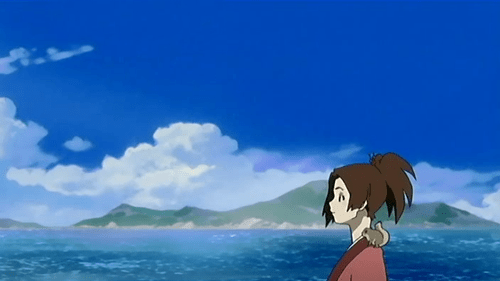Samurai Champloo, one of the pinnacles of anime artistry, isn’t just an exhilarating tale of adventure; it’s a unique and profound work of art exploring themes of friendship, purpose, and freedom. For many fans, the ending of Samurai Champloo is one of the most crucial parts of the story, prompting the question: is this ending truly a good one?
What is Samurai Champloo’s story ?
“Samurai Champloo” is an anime series created by Shinichirō Watanabe, known for his work on “Cowboy Bebop.” Set in an alternate version of Japan during the Edo period, it follows the adventures of three unlikely companions: Mugen, Jin, and Fuu.
Mugen is a reckless and unconventional swordsman with a wild fighting style, while Jin is a stoic and traditional samurai skilled in the art of kenjutsu. The two warriors cross paths when they are both arrested and condemned to execution for their violent behavior. Before they can meet their fate, Fuu, a young and spirited girl, intervenes and convinces them to help her find a mysterious samurai who smells of sunflowers.
United by this common goal, the trio embarks on a journey across Japan, encountering a diverse cast of characters and facing numerous challenges along the way. As they travel, they become entangled in various conflicts, including clashes with rival samurai, encounters with assassins, and run-ins with government officials. Despite their differences, Mugen, Jin, and Fuu form a close bond as they navigate the dangers of their tumultuous world.
Throughout the series, “Samurai Champloo” explores themes of friendship, honor, and self-discovery against the backdrop of historical Japan. The blend of samurai action, humor, and anachronistic elements, such as hip-hop music and modern slang, gives the show its unique and distinctive style. As the story unfolds, the true motivations behind Fuu’s quest and the identity of the enigmatic samurai are gradually revealed, leading to a climactic and emotionally resonant conclusion.
The end of this story
The ending of “Samurai Champloo” is poignant and emotionally resonant, bringing closure to the journeys of its main characters while leaving room for interpretation. Throughout the series, Mugen, Jin, and Fuu have faced numerous challenges and adversaries as they traveled across Japan in search of the samurai who smells of sunflowers.
In the final episodes, the trio finally confronts their respective pasts and adversaries. Mugen, facing off against a deadly assassin from his past, showcases his unique fighting style and indomitable spirit. Jin confronts his former mentor in a duel that tests his commitment to his samurai code and his desire for redemption. Meanwhile, Fuu’s determination to find the samurai who holds the key to her past is put to the ultimate test as she comes face to face with the truth she has been seeking.
As the series reaches its climax, the fates of the main characters are decided in a series of intense and emotional confrontations. While the ending provides closure to many of the storylines, it also leaves some questions unanswered and allows for interpretation. The significance of the samurai who smells of sunflowers and the true nature of Fuu’s quest are left open to the viewer’s interpretation, adding depth and complexity to the narrative.
Ultimately, the ending of “Samurai Champloo” is a testament to the bonds of friendship and the power of redemption. It highlights the growth and evolution of its main characters as they come to terms with their pasts and embrace their futures. With its blend of action, drama, and emotion, the ending of “Samurai Champloo” is a fitting conclusion to one of anime’s most beloved series.
Is it good or bad ?
1. The Perfect Blend of Resolution
One of the reasons why the ending of Samurai Champloo resonates with so many viewers is its ability to tie up loose ends while leaving room for interpretation. Unlike some anime that rush through their conclusions or leave crucial questions unanswered, Samurai Champloo strikes a delicate balance between resolution and ambiguity. By the end, viewers gain a sense of closure while still being encouraged to contemplate the deeper themes and messages woven throughout the series.
2. Character Development
Throughout Samurai Champloo, viewers witness the growth and evolution of its main characters: Mugen, Jin, and Fuu. Each of them embarks on a personal journey, overcoming their pasts and discovering their true identities. The ending serves as the culmination of these journeys, offering satisfying resolutions to their individual arcs. Whether it’s Mugen’s reconciliation with his tumultuous past, Jin’s acceptance of his samurai code, or Fuu’s quest for closure, the conclusion of Samurai Champloo feels earned and well-deserved.
3. Emotional Impact
Perhaps the most compelling aspect of Samurai Champloo’s ending is its emotional resonance. As the series reaches its climax, viewers are invested not only in the fate of the characters but also in the deeper themes of loyalty, sacrifice, and redemption. The final moments of the show leave a lasting impression, eliciting a range of emotions from joy to sorrow. It’s a testament to the skill of the creators that they can evoke such powerful feelings in their audience, making the ending of Samurai Champloo a memorable and impactful experience.



